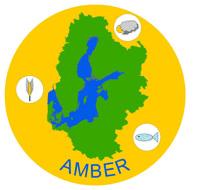Difference between revisions of "AMBER"
SSchumacher (talk | contribs) |
SSchumacher (talk | contribs) |
||
| Line 2: | Line 2: | ||
| − | The | + | '''AMBER Concept''' |
| + | The general aim of AMBER is the implementation and application of the Ecosystem Approach to Management (EAM) to the Baltic Sea with a focus on the coastal ecosystem (CE). | ||
| + | The first step of AMBER is the separation of climate from anthropogenic signals in the CE by means of a combinatorial variation in model’s boundary conditions using the output of existing regional climate change scenarios and the output of a watershed model simulating changes in land use. | ||
| + | The second step of AMBER is the application of models for future projections. To reduce the problem of model uncertainties, the ensemble method will be applied. The resulting projections are milestones for the development of EAM tools. | ||
| − | + | '''Towards an Ecosystem Approach to Management''' | |
| + | A successful implementation of the "ecosystem approach to management of human activities" concept requires the best available scientific information as a basis for integrated management. Therefore, retrospective analyses on long-term data sets, intensive modelling with different types of models and selected measurements of biogeochemical transformation processes in the coastal water and the groundwater will be applied and integrated on the “Research Level”. In a second step AMBER will apply models for future projections. To reduce the problem of model uncertainties, the ensemble method will be applied. The resulting projections are milestones for the development of EAM tools on the policy and advisory level. | ||
| + | |||
| + | '''AMBER Goals''' | ||
| + | The most important goals of AMBER are: | ||
| − | + | * Qualitative risk assessments for various climate change scenarios, land uses and life style change scenarios. | |
| − | + | * Derivation of mitigation strategies from the risk assessment. Mitigation strategies are necessary tools for integrated management. | |
| − | + | * Development of Ecological Quality Objectives (EcoQOs) for the application of EAM following the guidance of ICES (2005). EcoQOs are a basis for | |
| − | + | * the development of indicators, limits and targets. These quantitatively describe ecosystem state, ecosystem properties or impacts. Finally, cost-effective indicators will be developed to improve monitoring strategies and to guide environmental management in decision making. | |
| + | |||
| + | |||
| + | EAM with its tools risk assessment, mitigation strategies, derivation of EcoQOs and improvement of monitoring strategies will be the core of science based advice for integrated management. | ||
| − | |||
| − | |||
| − | |||
| − | |||
AMBER contributes to the objectives of BALTEX. | AMBER contributes to the objectives of BALTEX. | ||
Revision as of 11:23, 31 August 2011
AMBER Concept
The general aim of AMBER is the implementation and application of the Ecosystem Approach to Management (EAM) to the Baltic Sea with a focus on the coastal ecosystem (CE).
The first step of AMBER is the separation of climate from anthropogenic signals in the CE by means of a combinatorial variation in model’s boundary conditions using the output of existing regional climate change scenarios and the output of a watershed model simulating changes in land use.
The second step of AMBER is the application of models for future projections. To reduce the problem of model uncertainties, the ensemble method will be applied. The resulting projections are milestones for the development of EAM tools.
Towards an Ecosystem Approach to Management
A successful implementation of the "ecosystem approach to management of human activities" concept requires the best available scientific information as a basis for integrated management. Therefore, retrospective analyses on long-term data sets, intensive modelling with different types of models and selected measurements of biogeochemical transformation processes in the coastal water and the groundwater will be applied and integrated on the “Research Level”. In a second step AMBER will apply models for future projections. To reduce the problem of model uncertainties, the ensemble method will be applied. The resulting projections are milestones for the development of EAM tools on the policy and advisory level.
AMBER Goals
The most important goals of AMBER are:
- Qualitative risk assessments for various climate change scenarios, land uses and life style change scenarios.
- Derivation of mitigation strategies from the risk assessment. Mitigation strategies are necessary tools for integrated management.
- Development of Ecological Quality Objectives (EcoQOs) for the application of EAM following the guidance of ICES (2005). EcoQOs are a basis for
- the development of indicators, limits and targets. These quantitatively describe ecosystem state, ecosystem properties or impacts. Finally, cost-effective indicators will be developed to improve monitoring strategies and to guide environmental management in decision making.
EAM with its tools risk assessment, mitigation strategies, derivation of EcoQOs and improvement of monitoring strategies will be the core of science based advice for integrated management.
AMBER contributes to the objectives of BALTEX.
